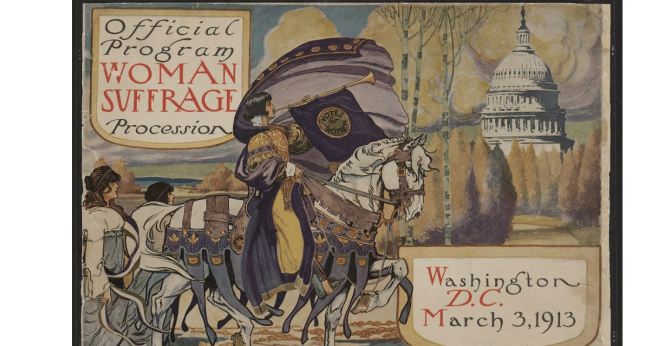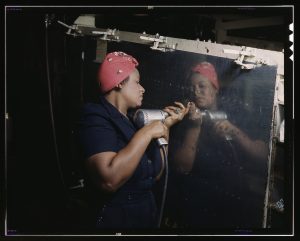
(Official program, Women's Suffrage Procession, March 13th, 1913, Washington D.C.)
In 1981, Congress passed Pub. L. 97-28 which authorized the President to proclaim the week beginning March 7,1982 as “Women’s History Week.” In the following years, efforts would be made to reinstate Women's History Week each year until 1987, after being petitioned by the National Women’s History Project, Congress passed Pub. L. 100-9, designating the month of March as the first “Women’s History Month.”
Created to celebrate and commemorate women's contributions to American history that are often overlooked, each March we highlight influential women, past and present and recognize their ongoing struggle for equality. The Library of Congress, the National Archives, National Gallery of Art, National Park Service, and the Smithsonian Institute have partnered together to showcase several special exhibitions, in person and online including a Dorothea Lange Photography Exhibition, as well as other female contributions that have shaped the social, cultural and economic landscape of this country. Check out more exhibits and collections at the official site here!
March 16th is also National Quilting Day so be sure to sneak a peek at some amazing quilts from our local Ozone Layers Quilt Guild now on display at the Causeway, Covington, Slidell, Mandeville and Madisonville Branches! The American tradition of quilting was often a multigenerational art form and a group activity for women within their communities. "From rags to richness: Piecing the patchwork of American culture," by Tracy L. Vaughn-Manley, a professor at Northwestern University, explains how the quilt can be thought of as a historical document.
Interested in more women's history? These online library resources below are a great place to begin your historical research!
 (Woman working a hand drill on a "Vengeance" Dive Bomber, 1943, Nashville, Tennessee)
(Woman working a hand drill on a "Vengeance" Dive Bomber, 1943, Nashville, Tennessee)
EBSCO's Biography Reference Center houses than 450,000 full text biographies, including the complete full text run of Biography Today and Biography Magazine, as well as thousands of narrative biographies that are not available in other databases.
Black Life in America collection offers more than 19,000 American and global news sources, including over 400 current and historical Black publications, to provide a window into African American history, culture, and daily life—as well as the ways the dominant culture has portrayed and perceived people of African descent.
EBSCO's History Reference Center offers full text reference books, encyclopedias and non-fiction books, as well as full text for more than 150 leading history periodicals and nearly 57,000 historical documents, pictures and maps.
JSTOR provides access to more than 10 million academic journal articles, books, and primary sources in 75 disciplines.
Louisiana Digital Library- An online library of over 144,000 digital materials about Louisiana's history, culture, places, and people. *
National Geographic VI People Animal World 1888-Current provides students and researchers an easy-to-use method of accessing the wealth of material from National Geographic magazines (including National Geographic History)
World Book Timelines- view premade historical timelines, or build and share historical timelines using your own events and images or content and images from World Book.
All pictures used in this article are free to use provided by the Library of Congress at the link here. Remember, when accessing these databases from home, be sure to have your library card handy as you will need it to log in when off-site. (*with the exception of the Louisiana Digital Library)


Add a comment to: Women’s History Month